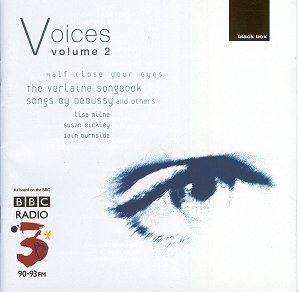This disc is part of a series which aims to make
available to the wider public some of the recordings made for
BBC Radio 3’s "Voices" series, masterminded by Iain
Burnside. The present collection is based around the poetry of
Paul Verlaine, with Debussy as the leitmotif but with space for
some fairly rare material along the way. The omission of Fauré
is deliberate – this will be for another project.
The idea is so attractive that I feel sorry to
have to list a series of smallish niggles which have the cumulative
effect of making the disc less enjoyable than it might have been.
In the arpeggios which open "La mer est plus belle"
Debussy didn’t actually ask for an accent on the lower note of
each arpeggio, but they come on the strong beats. If you don’t
make accents the ear will hear the upper note as the most important
one, and Debussy’s powerfully pulsating ocean is replaced, as
here, by an amorphous Technicolor splurge. And then, at "Nourrice
fidèle" on the second page, there’s a sudden drop
from "forte" to "piano" which, if done correctly,
makes an awesome effect, rather like a film camera suddenly cutting
to another part of the seascape. This performance evens all the
dynamics out and so does not give more than a generalised impression
of the music. It also seems strange, when the score specifically
says "mezzo-soprano or baritone", and there’s a mezzo-soprano
waiting in the wings, to allot this first Debussy group to the
soprano. It’s not so much a question of range (since the songs
lie between B and F sharp anyone from a high soprano to a contralto
could theoretically cope with them), it’s a question of timbre.
Debussy surely wanted a darker sound than we are likely to get
from a pure soprano. There are other songs in this programme where
I wondered if the right singer was being used.
To return to my niggles about the pianist, the
repeated Bs in the third bar of "L’échelonnement des
haies" are accented but not staccato in my score, and at
the end of "Mandoline" Debussy asked for the lower G
to be held in the pedal, while Burnside plays it "sec",
as at the beginning (where Debussy put no marking). Do these little
things matter so much? Well, if Debussy wrote them in his score
I suppose he wanted them done, and people who play his music must
expect to be taken to task if they ignore them. A completely different
matter might be an avowedly re-creative interpretation, which
asks to be taken on its own terms.
As well as much of the Debussy, the rare Szulc
song is one which calls for comparison with the classic Maggie
Teyte version. Burnside is accomplished enough in the introduction
but with Gerald Moore the bell-like sounds and the semi-quavers
which weave around them seem to be two independent things – another
world of pianistic achievement. And just listen to how Teyte places
the words "charmants masques et bergamasques" to hear
the difference between God-given interpretation and just reasonably
good singing. Even before I checked back to the older version
I was unconvinced by Milne’s and Burnside’s impatient treatment
of the second stanza of this song. Teyte and Moore gain infinitely
by keeping it spacious. Milne might also compare her own loose
vibrato on the higher notes with Teyte’s steady production when
she was getting on for sixty, and wonder what she herself will
sound like at the same age if she doesn’t take the matter in hand.
Fortunately Susan Bickley has a steadier vocal
production allied with more considered interpretations. I enjoyed
all her contributions. I also felt that Burnside himself, perhaps
as a result of working with a singer whose own ideas were clearer,
acquitted himself better. He does not attempt Cortot’s "prepared
piano" effect in "Le faune" but then, Debussy didn’t
ask him to. Did either Teyte or Cortot have personal knowledge
from the composer about this, I wonder? While the superiority
of Teyte over Milne is clear in the first set of "Fêtes
galantes", matters are much more even in the second set.
As the more "modern" singer, Bickley allows slightly
more "bel canto" legato than Teyte, which creates a
more musical effect in songs which can risk sounding like poems
for the piano with a semi-spoken vocal line glued on. Furthermore,
Bickley’s legato singing doesn’t prevent her from treating the
words with imagination. At "c’est possible" in "colloque
sentimental" which concludes the disc, she beats Teyte at
her own game.
This is a disc I shall value for the programme
itself and for Bickley’s contributions, and maybe also for Burnside’s
accompanying essay, informative and readable. Just to complete
my catalogue of niggles, the translation in the booklet of the
poem set by Vaughan Williams is completely different from the
one the composer actually used. More care please!
Christopher Howell

